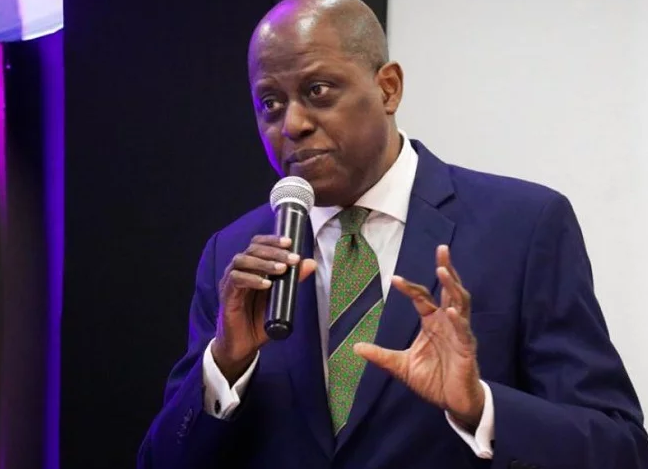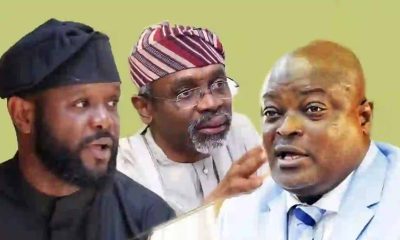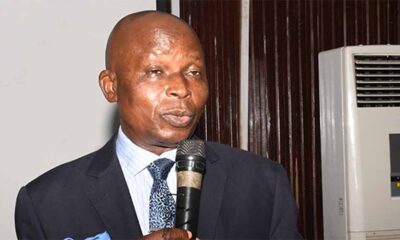Business
Nigeria’s bid to nail P&ID in $9bn case suffers setback

Nigeria’s bid to set aside the $9bn P&ID Limited’s arbitration award has suffered a setback as VR Capital Group Limited has secured a United States’ court ruling to block the Federal Government from accessing its internal documents.
The move to access the documents was part of the government’s attempt to stop P&ID Limited, partly owned by VR, from collecting the nearly $9bn arbitration award.
US District Judge, Paul Engelmayer, in New York granted the hedge fund’s motion, overturning a ruling from May and quashing subpoenas issued by Nigeria.
Bloomberg reported that Nigeria sought the information to aid a corruption probe into P&ID Ltd., a company in which VR Capital acquired a 25 per cent interest in 2018.
Nigeria’s anti-graft agency is investigating a gas-supply contract a former minister concluded with P&ID in 2010 and subsequent arbitration proceedings that resulted in the hefty penalty against the country three years ago. The federal government alleged that the British Virgin Islands-registered company developed sham arrangements designed to fail and has accused P&ID of bribing its officials.
Nigeria is in English courts attempting to overturn both the 2017 arbitration award and a decision by a UK judge last year upholding it, claiming P&ID’s alleged fraud only recently came to light.
P&ID had denied any wrongdoing, saying Nigeria invented the accusations to evade its legal obligations.
Six months ago, Judge Lorna Schofield, also in the Southern District of New York, granted Nigeria permission to gather information from US banks concerning transactions involving companies and people affiliated with P&ID, as well as former government officials.
The Nigerian government also wanted VR Capital to hand over documents concerning its purchase of P&ID shares as well as the decade-old contract and ensuing arbitration.
But VR Capital applied to the federal court in New York to set aside the subpoenas principally on the grounds that Nigeria should have sought authorisation through its mutual legal assistance treaty with the United States. While the hedge fund is based in London, the four entities and two directors targeted by Nigeria are in New York.
Nigeria “misled” Schofield by denying any intention to use the documents in the English proceedings, according to Engelmayer’s November 6 opinion.
VR Capital claimed Nigeria would use the information provided by the hedge fund for the same goal.
Nigeria told Engelmayer that the main use of VR Capital documents would be in its domestic corruption probes. In his ruling, Engelmayer accepted Nigeria’s argument that it would be permissible for the government to present some material to support efforts to challenge the arbitration award in England.
However, a review of the request by the U.S. Justice Department under the treaty would help decide if the information sought was “genuinely intended for use in a criminal prosecution or investigation” or “the improper purpose of fortifying Nigeria’s attempt in the English courts to void the multi-billion-dollar arbitral award against it,” Engelmayer said.
It is unclear if Nigeria plans to submit a new application under the bilateral agreement.
“Delay tactics” adopted by VR Capital and P&ID are “prolonging the discovery process and preventing us from obtaining critical evidence,” a spokeswoman for Nigeria’s Attorney General and Minister of Justice, Mr. Abubakar Malami, said.
“These evasive efforts are manifestly inconsistent with P&ID’s position that it has nothing to hide,” she said.
“Misleading the U.S. court” is part of Nigeria’s last-ditch efforts to avoid payment of the arbitration award,” said Zachary Rosenbaum, a lawyer at Kobre & Kim LLP who is representing P&ID and VR Capital.
Nigeria scored a victory in September when a London judge ruled the government had established a “strong prima facie case of fraud” against P&ID and should be permitted to test its allegations at a trial to determine the legitimacy of the arbitration award.
Following the decision, Nigeria’s lawyers wrote to Engelmayer asking him to dismiss VR Capital’s motion.
Information collected from the banks had contributed evidence to the anti-corruption agency’s probe, which in turn had been “critical” to the country’s success in the English court, they said.
Business
Nigeria’s foreign reserves in marginal increase, now $40.88bn

Nigeria’s foreign reserves in marginal increase, now $40.88bn
Nigeria’s foreign reserves rose to $40.88 billion as of November 21, the Governor of the Central Bank of Nigeria (CBN), Olayemi Cardoso, has said.
Cardoso disclosed this on Tuesday at a press conference after the Monetary Policy Committee’s 298th meeting in Abuja.
He said the external reserves grew from $40.06 billion at the end of October to $40.88 billion in November.
The amount represents an increase of $82 million or 2.05 per cent in 21 days.
“The external reserves rose marginally to 40.88 billion as of 21 November 2024, from 40.06 billion at the end of October 2024, available to finance 17 months of imports,” he said.
However, from the apex bank’s website, the increase in Nigeria’s foreign reserves showed $40.27 billion on November 22.
Cardoso also said, “The process of getting us where we are in terms of reserves has been a long one”.
“It is a clear indication that the policies we have put in place are certainly yielding fruits,” he added.
“However, and it’s very important to make a distinction here and to reiterate the fact that reserves are there for a multiplicity of different purposes, not least of which is to create buffers in the event of unanticipated shocks.
“So they are not there to simply whittle away. They are there to be used to more or less defend yourself where that becomes necessary
“And when we talk about shocks that are not anticipated, I think we can see how the global economies are.”
Cardoso also said the bank would continue to intensify efforts to stabilise the currency and prices.
The CBN governor said, “The currency has been stable compared to what it was in June”.
But he said for the value of the country’s currency to be stable, there must be increased exports and diversification of the economy.
Cardoso said diaspora remittance had increased due to policies put in place.
He commended those in the diaspora for helping the country accomplish over $600 million in remittances.
Business
Naira rises to N1,755/$ in parallel market

Naira rises to N1,755/$ in parallel market
The Naira yesterday appreciated to N1,755 per dollar in the parallel market from N1,770 per dollar on Monday.
Similarly, the Naira appreciated to N1,659.44 per dollar in the Nigerian Autonomous Foreign Exchange Market, NAFEM.
Data from FMDQ showed that the indicative exchange rate for NAFEM fell to N1,659.44 per dollar from N1,675.62 per dollar on Monday, indicating N16.18 appreciation for the naira. The volume of dollars traded (turnover) increased by 219.5 percent to $425.98 million from $108.79 million traded on Monday.
READ ALSO:
- Nigeria Customs returns 21 stolen luxury vehicles to Canada
- Pro-Wike Rivers lawmakers move to prevent probe of FCT minister tenure as governor
- Bianca raises hope Tinubu will free Nnamdi Kanu to restore peace in South-East
Consequently, the margin between the parallel market and NAFEM rate narrowed to N95.56 per dollar from N117.38 per dollar on Monday.
Naira rises to N1,755/$ in parallel market
Business
PH refinery to blend 1.4-million litre petrol daily – NNPC

PH refinery to blend 1.4-million litre petrol daily – NNPC
Rehabilitated old Port Harcourt refinery is currently operating at 70 per cent of its installed capacity, the Nigerian National Petroleum Company Limited has said.
The Port Harcourt Refining Company (PHRC) operates two refineries: the old refinery with a capacity of 60,000 barrels per stream day (bpsd) and a new refinery with an installed capacity of 150,000 bpsd.
The NNPCL in a statement on Tuesday, said it planned to increase the operation to 90 per cent of the refinery’s capacity.
“The Board and Management of the Nigerian National Petroleum Company Limited (NNPC Ltd) express heartfelt appreciation to Nigerians for their support and excitement over the safe and successful restart of the 60,000 barrels-per-day Old Port Harcourt Refinery,” the statement reads.
“This achievement marks a significant step forward after years of operational challenges and underperformance.
“We are, however, aware of unfounded claims by certain individuals suggesting that the refinery is not producing products. For clarity, the Old Port Harcourt Refinery is currently operating at 70% of its installed capacity, with plans to ramp up to 90%.”
According to NNPC, the refinery has commenced production of daily outputs of straight-run petrol (naphtha), which is blended into 1.4 million litres of petrol.
The national oil company said the refinery has also started producing 900,000 litres of kerosene per day and 1.5 million litres per day of diesel.
The NNPC said 2.1 million litres daily volume of low-pour fuel oil (LPFO) would also be produced at the refinery, adding that additional volumes of liquefied petroleum gas (LPG) will be refined at the plant.
“It is worth noting that the refinery incorporates crack C5, a blending component from our sister company, Indorama Petrochemicals (formerly Eleme Petrochemicals), to produce gasoline that meets required specifications,” NNPC said.
“Blending is a standard practice in refineries globally, as no single unit can produce gasoline that fully complies with any country’s standards without such processes.”
Additionally, the NNPC said it has made substantial progress on the new Port Harcourt refinery, “which will begin operations soon without prior announcements”.
“We urge Nigerians to focus on the remarkable achievements being realized under the able and progressive leadership of President Bola Tinubu and to support efforts aimed at delivering more dividends to the nation,” the energy firm said.
According to the statement, malicious attacks on “clear progress” only undermine the “significant strides made by NNPC Ltd and the country”.
-

 metro24 hours ago
metro24 hours agoBREAKING: Port Harcourt refinery begins operation
-

 Business3 days ago
Business3 days agoJust in: Dangote refinery reduces petrol price for marketers
-

 metro2 days ago
metro2 days ago40-foot container falls on car in Lagos
-

 Politics3 days ago
Politics3 days ago2027: Lagos Speaker, Obasa joins gov race, may battle Seyi Tinubu, others
-

 Politics2 days ago
Politics2 days agoLagos 2027: Seyi Tinubu campaign team releases his life documentary
-

 International2 days ago
International2 days agoTrump to sack 15,000 transgender officers from U.S. military: Report
-

 Education17 hours ago
Education17 hours agoUS University opens 2025 scholarships for international students
-

 Entertainment2 days ago
Entertainment2 days agoPolygamy best form of marriage for Africa – Okey Bakassi













You must be logged in to post a comment Login